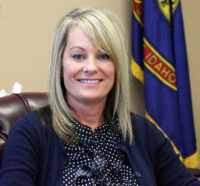State superintendent Sherri Ybarra heaved the equivalent of a March Madness buzzer-beater Friday, attempting to score a win for her rural schools center in the closing days of the legislative session.

Ybarra has pitched the rural school center since before the session kicked off in January. But Gov. Butch Otter and legislative budget-writers did not recommend funding the $300,000 center. Lawmakers have said for weeks they had unanswered questions about her proposal.
On Friday she attempted to answer those questions and gain momentum for her proposal through a new bill. The bill would establish a North Idaho regional pilot project, or incubator, which would work with 13 local school districts. Ybarra eventually envisions numerous regional centers across the state offering more than a dozen services for sale, her bill would create one center offering two services in 2016-17. The bill also calls for hiring a director, a part-time business manager and an administrative assistant.
Potential services offered for sale include business management, public relations, nursing, special education services, professional development, data quality training, IT support and more — although the two services that would initially be offered have yet to be identified.
Her proposal is based partially on a series of Washington-based centers that maintain operating budgets of approximately $15 million and add a 9 percent administrative fee to the services they sell.
Ybarra said the centers are necessary to help rural and geographically isolated districts obtain needed services and resources.
“Idaho is more than 70 percent rural, and the challenges our rural school districts face are significant,” Ybarra said.
Lawmakers voted to not only introduce the bill, but to place it on a legislative fast track.
“It seems like an exceptional opportunity to bring (forward) a lot of the things we discuss here in the education community, and I know the superintendents in my district are very excited,” said Rep. Sage Dixon, R-Ponderay.
Even though some committee members expressed concerns with the bill’s estimated cost and details, the committee voted to skip staging a full hearing. Instead, the committee sent the bill directly to the House floor.
Rep. Steven Harris opposed advancing the bill so quickly, saying he has serious questions about the cost estimate. It states the proposal “would have no direct impact to the general fund” even though Ybarra told lawmakers it would cost $300,000 in ongoing, annual expenses.
Committee Vice Chairwoman Julie VanOrden lamented that the proposal would benefit only 13 districts in North Idaho districts — not the dozens of other rural, remote districts scattered across the state.
Rep. Ryan Kerby supported the bill, but the New Plymouth Republican complained after Ybarra said she does not envision ever launching a rural center near the Treasure Valley. Aside from large districts such as Boise, the area includes several small, rural districts, and they could benefit from a center, Kerby said.
Fast-tracking the bill surprised Chairman Reed DeMordaunt, R-Eagle, and Ybarra. She expected the bill to be printed as a courtesy to jumpstart negotiations for 2017.
“It just goes to show legislators truly want to do the right thing for our children in Idaho and they are excited about moving forward and I’m excited that they made this a priority,” Ybarra said.
With lawmakers seeking to adjourn the session next week, it remains to be seen what will happen to the proposal. It heads next to the House floor, but would still need to advance through the Senate. Locating and approving the $300,000 is also unresolved.
In other Statehouse action Friday:
College scholarships. A $5 million boost in college scholarships has passed the Legislature.
Senate Bill 1398, a State Board of Education spending bill, includes the $5 million Opportunity Scholarship increase proposed by Otter. The State Board has said the $5 million could fund an additional 1,700 scholarships. The state awarded 1,900 scholarships in 2015-16, but more than 4,000 students were eligible for the aid.
The House passed SB 1398 on a 45-24 vote. It has already passed the Senate, so it now heads to Otter’s desk.
Leadership premiums. House Education took another crack at increasing the value of bonuses for educators who go the extra mile.
It had appeared changes to the leadership premium program were dead for 2016. However, VanOrden is pushing a new bill to increase those bonuses.
The minimum bonus educators would receive would increase from $850 to $900, whether an employee works full- or part-time.
This addresses a controversy that flared up in House Education earlier this month. Lawmakers bristled at a state report showing that some educators earned bonuses of less than $850, despite the minimum set in law.
The bonuses are available to educators who accept hard-to-fill positions, mentor other teachers, earn advanced degrees within the subject they teach, teach dual credit courses and more.
VanOrden’s leadership premium bill is another piece of legislation with an uncertain future. Even if VanOrden successfully shepherds it through the House, it will still need to clear the Senate. Additionally, legislative budget writers have yet to provide any new funding to increase bonuses.
